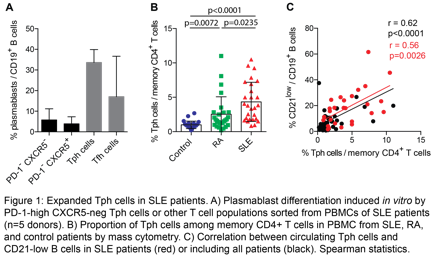Session Information
Date: Wednesday, October 24, 2018
Title: 6W024 ACR Abstract: SLE–Etiology & Pathogenesis II (2946–2951)
Session Type: ACR Concurrent Abstract Session
Session Time: 11:00AM-12:30PM
Background/Purpose:
Pathologic T cell-B cell interactions and production of autoantibodies are hallmark features of SLE. T follicular helper (Tfh) cells are generally considered the principal T cell population capable of helping B cells. However, distinct T cell populations can augment B cell responses in chronically inflamed peripheral tissues. We recently described a dramatically expanded population of T peripheral helper (Tph) cells that promotes B cell responses in synovium of patients with seropositive RA. Here we evaluate the frequency, phenotype, and clinical associations of Tph cells in the circulation of patients with lupus.
Methods:
Mass cytometry data from the Accelerating Medicines Partnership RA/SLE Network were used to quantify cell populations in PBMCs from 27 lupus nephritis patients, 27 RA patients, and 25 non-inflammatory controls. Frequencies of Tph cells (PD-1hi CXCR5– CD4+ T cells), Tfh cells (PD-1hi CXCR5+ CD4+ T cells), and CD21low CD19+ B cells were quantified by standardized gating, and associations with SLEDAI and dsDNA titers were assessed. For in vitro T cell-B cell co-cultures, sorted Tph cells, Tfh cells, or control T cell populations from SLE patients were co-cultured with memory B cells and stimulated with SEB + LPS, and CD38hi CD27+ plasmablasts were quantified at day 5.
Results:
We first confirmed that Tph cells (PD-1hi CXCR5– CD4+ T cells) from SLE patients possess B cell helper function, as we previously observed in RA. Tph cells sorted from blood from 5 different lupus patients strongly induced B cell differentiation into CD38hi CD27+ plasmablasts in vitro (Figure 1A). By mass cytometry, Tph cells are markedly expanded in the circulation of SLE patients compared to non-inflammatory controls (4.3-fold increase, p<0.0001, Figure 1B). Tfh cells are also increased in the SLE patients compared to controls (1.9-fold); however, the magnitude of the increase in Tph cells in SLE patients well exceeds that of Tfh cells. Tph cell frequency is higher in lupus nephritis patients with dsDNA titers >50 (p=0.017) and with SELENA-SLEDAI > 10 (p=0.046) compared to patients with lower disease activity measures. Similar associations with disease activity were not observed for Tfh cells. Expression of surface receptors on Tph cells from SLE and RA patients was similar. A strong positive correlation emerged between the frequencies of Tph cells and CD21low B cells, an activated B cell population highly expanded in SLE (Spearman r=0.56, p=0.0026, Figure 1C). In contrast, no correlation was seen between Tfh cells and CD21low B cells in SLE patients.
Conclusion:
Tph cells are markedly expanded in the circulation of patients with SLE and demonstrate robust B cell helper function. The strong and specific positive correlation between Tph cell and CD21low B cell frequencies suggests that these cells may act coordinately in the pathologic autoimmune response in SLE.
To cite this abstract in AMA style:
Rao D, Bocharnikov A, Fonseka C, Keegan J, Diamond B, Anolik J, Nigrovic P, Raychaudhuri S, Lederer JA, Brenner M. T Peripheral Helper Cells Are Expanded in the Circulation of Active SLE Patients and Correlate with CD21low B Cells [abstract]. Arthritis Rheumatol. 2018; 70 (suppl 9). https://acrabstracts.org/abstract/t-peripheral-helper-cells-are-expanded-in-the-circulation-of-active-sle-patients-and-correlate-with-cd21low-b-cells/. Accessed .« Back to 2018 ACR/ARHP Annual Meeting
ACR Meeting Abstracts - https://acrabstracts.org/abstract/t-peripheral-helper-cells-are-expanded-in-the-circulation-of-active-sle-patients-and-correlate-with-cd21low-b-cells/

